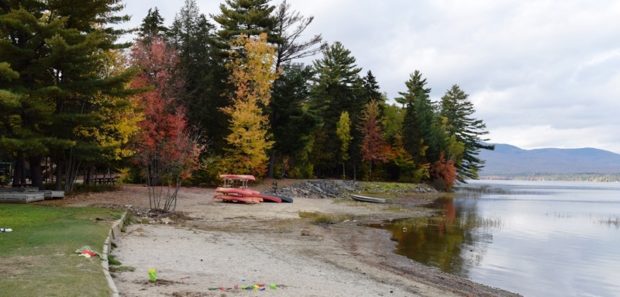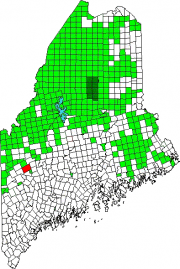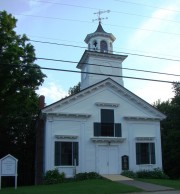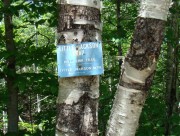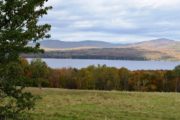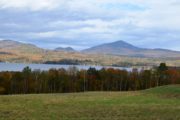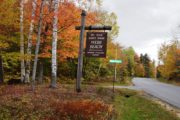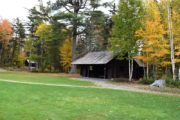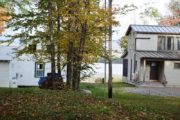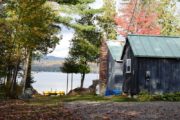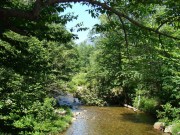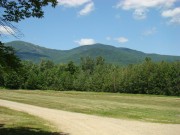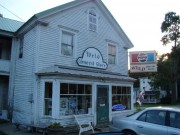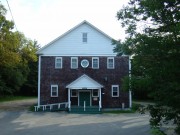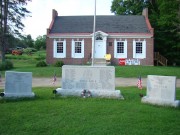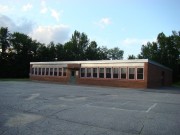| Year | Population |
|---|---|
| 1970 | 360 |
| 1980 | 435 |
| 1990 | 430 |
| 2000 | 402 |
| 2010 | 419 |
| Geographic Data | |
|---|---|
| N. Latitude | 44:41:54 |
| W. Longitude | 70:26:59 |
| Maine House | District 112 |
| Maine Senate | District 17 |
| Congress | District 2 |
| Area sq. mi. | (total) 63.0 |
| Area sq. mi. | (land) 59.6 |
| Population/sq.mi. | (land) 7.0 |
County: Franklin
Total=land+water; Land=land only |
|
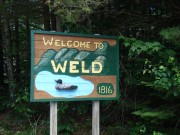 [WELD] is a town in Franklin County, settled in 1800 and incorporated on February 8, 1816 from Webb’s Pond Plantation, formerly township 5 AP. Its Congregational Church serves the town since 1809.
[WELD] is a town in Franklin County, settled in 1800 and incorporated on February 8, 1816 from Webb’s Pond Plantation, formerly township 5 AP. Its Congregational Church serves the town since 1809.
Weld is the birthplace and boyhood home of Joseph B. Stearns, who became wealthy after inventing a system of sending two telegraph messages on a single wire at the same time.
The 2,146 acre Webb Lake, 42 feet at its deepest, is the main attraction to this recreational area, with Mount Blue State Park located on both sides of the lake.
Spruce Mountain to the west overlooks the lake. Mount Blue itself is located in the easterly adjoining town of Avon.
Several cottages dot the west shore of Webb Lake, just outside Mount Blue State Park.
Weld is the gateway to Tumbledown Mountain and Little Jackson Mountain, both popular hiking destinations in Township 6 North of Weld.
The main village is located on the eastern shore of the lake, at the junction of Maine Routes 142 and 156.
Form of Government: Town Meeting-Select Board.
Additional resources
“The History of the Town of Weld: Just a Century Old.” Lewiston, Me. Lewiston Journal. 1916. (Article extracted from: Lewiston Journal, August 26, 1916.)
A History of Weld, Maine. Weld, Me. Weld Historical Society, 1983. [University of Maine at Farmington, Mantor Library]
I Remember When– a Weld Family Album: A Celebration in Pictures of the Town of Weld, Maine. Weld, Me. Weld Historical Society. 1993. [Maine State Library]
*United States. Department of the Interior. National Park Service. “Weld Town Hall.” https://npgallery.nps.gov/pdfhost/docs/nrhp/text/07000597.PDF
Weld Sesquicentennial, 1816-1966. 1966. [University of Maine, Raymond H. Fogler Library, Special Collections; Maine State Library]
National Register of Historic Places – Listing
Weld Town Hall
[17 School Street] Since its construction, the Weld Town Hall has been at the center of community affairs. Countless votes, measureless concerts, numberless dinners, and numerous movies, plays, and ceremonies have occurred within its four walls and two spacious floors. Built by the Weld Masonic Lodge between 1922 and 1926, the hall has been owned by the Town of Weld since 1940. The Weld Town Hall continues to function as a Masonic meeting facility as well as serves the residents of the Town as a meeting hall, performance space, and athletic venue.
The future town of Weld was first surveyed in 1793 and by 1800 started to attract settlers, mostly from New Hampshire. In 1812 it was organized as Webb’s Pond Plantation, named for the large body of water located at the center of the town. Four years later, the Plantation was incorporated as the town of Weld, named after one of the land owners, Benjamin Weld of Boston, Massachusetts. Two villages developed in the 19th century, the upper village and the lower village, both on the east side of the pond. Initially the Town House was located in the upper village, but eventually the strength of this settlement gave way to the lower village, which increasingly attracted most of the town’s industry and dwellings.
Weld is located in a picturesque valley in south central Franklin County, and is surrounded by substantial mountains, that historically provided the resources for much of the town’s economic development. Mount Blue State Park borders the town on the east, and along with Webb Lake, draws a significant number of recreational visitors to the area.
The Weld Town Hall was erected in 1922 by the local chapter of the Masonic Lodge. The Mystic Tie Lodge, No. 154, Ancient Free and Accepted Masons, of Weld received their charter on May 4, 1870. Freemasonry underwent substantial growth during the Civil War and in the years that followed, and the Mystic Tie Lodge was on of 63 franchises established in Maine between 1860 and 1871. The Weld Masons initially met in the vestry of the Weld Congregational Church. In 1916, the Trustees of the Charity Fund of Mystic Tie Lodge purchased a 1.4 acre lot on the edge of Houghton Brook, and began to plan for the erection of a new hall. In order to raise the needed funds, four years later fourteen members of the Weld Masonic Lodge organized as the Weld Masonic Building Association. They incorporated with $10,000 of capital stock and an equal amount of common stock, of which they sold in fifty dollar shares. According to the certificate of organization, the “purposes of said corporation are buying, selling, building, owning, holding mortgages, leasing, renting, contracting for, managing, and generally dealing in real estate and personal property in the town of Weld.
The Building Association received a license to operate the ‘Mystic Theatre’ in the building in 1923. There were two entertainment venues in town in the 1920s: the Pavilion, a dance hall that also showed movies; and the Mystic Theatre. At first silent movies were screened, accompanied by a local pianist. The theater then upgraded to sound pictures once the technology had become available.
The 1929 stock market crash resulted in the local bank foreclosing on the Hall. In December of 1940, the town paid the bank and took over the Masonic Building and renamed it the Weld Town Hall. The Mystic Tie Lodge of Weld, which in 2007 had 75 active members, leased the second floor front rooms from the town for a nominal sum. [See photo above.]


